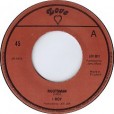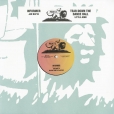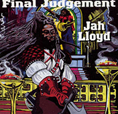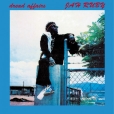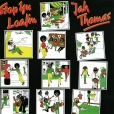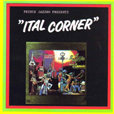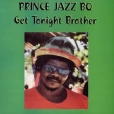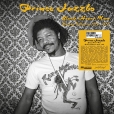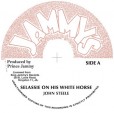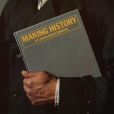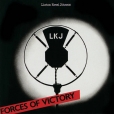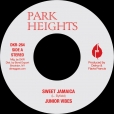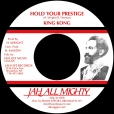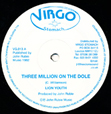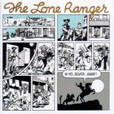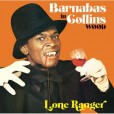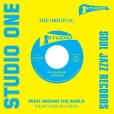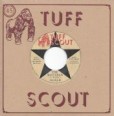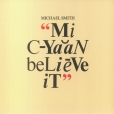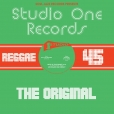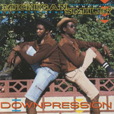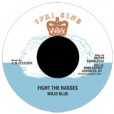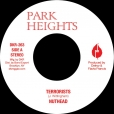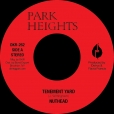Your basket is empty

A graduate of soundsystems like Gemini and Volcano Hi Power, Little John was twelve years old when he voiced this tune, shifting its sights from snitches and stoolies, straight to the head of all party-poopers. It appeared in 1983 during Sugar’s stay in London after Good Thing Going was a national pop hit in 1980, coming on the Stoke Newington label M And M - presumably named after Minott and his then-partner, Coxsone Dodd’s niece Maxine Stowe. Appearing first with Wackies’ pink-to-orange labels, Batta’s cut is a different mix again to the version on his album. He bows to U-Roy at the start, before switching to a more contemporary delivery. Sugar is in attendance throughout, almost as if the pair were taking turns at the mic, before the dub takes over.
Two versions, different dubwise mixes of Sugar Minott’s massive Informer rhythm — both choca with living dancehall vibes and Channel One-style deadliness.
Warehouse find; last box.
Stone classic. Stuffed with monster Lee Perry rhythms like War In A Babylon.
The first decent compilation of these Clement Bushay productions.
Downright crucial Jazzbo like Step Forward Youth and Every Nigger Is A Winner.
Upful, late-eighties singjaying, with nuff namechecks and squiddly diddlies, over a crisp, bustling rhythm.
Characteristically masterful singjaying; duetting with himself, for added dancehall vibes. The message calls for self-respect to be tempered by humility… probably a bit rich coming from KK. Sick rhythm.
In his dazzling, rubadub flow, with intricate rhyming, lavish word-play and off-the-wall allusiveness, his genial socialism and jubilant, green-fingered vegetarianism, his knockabout sense of humour and all-round irrepressible good vibes, Ranger is the peerless heir to U-Roy and Dennis Alcapone… and the most diplomatic of envoys for the new dancehall styles just around the corner. He’s undervalued because of a perceived lack of gravitas, but he’s one of the all-time great deejays, and this is his best work.
Have a listen to the musical shock attack Automatic: over Take A Ride, no less, he bundles the Last Poets into a breakneck stream of consciousness, with walk-ons for Marcus Garvey, Bag O Wire, and Garvey’s secretary Mother Muschett; Dovecot Memorial Park and Madison Square; a bad boy who doesn’t know Ranger’s dad is a cop; succinct advice like ‘natty don’t play card inna Babylon yard’; a big baboon in the light of the moon, a broken chair, a felt hat, an anchor you can’t conchor…
“Everybody was wondering why I sounded different. And the reason I sounded different was through I did grow in England and I have the English accent and when I speak you can hear every word I am saying clearly. It was a plus for me. And then through I liked to write poetry and write songs, you know I’m a writer, I stick to the topic from start to finish.”
And the musical rhythms are a preposterous fish-tea tidal wave of Studio One classics (plus a Shank I Sheck): Take A Ride/Truths & Rights, Real Rock/Armageddon Time, One Step Beyond, Hot Milk, Throw Me Corn, Never Let Go, Full Up, Please Be True, Things A Come Up To Bump.
So let the good time roll, with Sir Coxsone at the control. When Ranger talk, the dance it have fe cork.
Deliriously enjoyable. Terrific cover art, too.
Very highly recommended. Five ribbits, five bims, five flash-its, five oinks.
With Junjo and Soldjie at Channel One. Including the smash Diseases, in which Jah licks trouser-wearing women with ‘elephantiasis… the other one is the poliomyelitis… arthritis and the one diabetes.’
Dubplate, deejay piece to Fulk Reid’s Golden Daffodils (itself put back till the next batch of Digikillers, because of manufacturing problems). Mojo Blue aka Jah Mojo, from Santic.
Stark, powerful singjaying over tough, livewire digi; produced in Jamaica by Delroy Francis for his Claypot imprint, and originally released in 1987.
These are the original mixes, newly transferred from the master tapes.
Gritty sing-jay reportage, originally released in 1987 on a Claypot 12”, back-to-back with Terrorists. Produced in JA by Delroy Francis, more widely known nowadays as the guvnor of the Park Heights label and record shop in Brooklyn.
